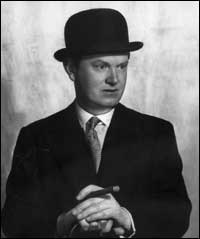Life is Nasty, British, and Short
 for Robert Ll...
for Robert Ll..."Was Anyone Hurt?": The Ends of Satire in A Handful of Dust by Jonathan Greenberg
"...If Waugh's fiction offers a useful case study in the paradoxes of satire, it is equally valuable for the questions it opens in understanding modernism. For Waugh's attitudes toward both modernism and modernity more generally are similarly vexed. As George McCartney has written: "Waugh's response to the modern was marked by certain fruitful ambivalence. In his official pose he was the curmudgeon who despised innovation, but the anarchic artist in him frequently delighted in its formal and thematic possibilities" (Roaring 3).2 Although Waugh later in life repeatedly denounced modernist formal experimentation, his early fiction nonetheless came to embody a modern sensibility in its apparent rejection of the novel's traditional ethical obligations. Even in matters of form, he didn't consider himself a traditionalist, but rather grouped himself with writers such as Firbank and Hemingway who deployed what Waugh sometimes called, following Wyndham Lewis, an "external method."3 Indeed, in Waugh, the satiric and the modern often look very much alike; while the author may claim to satirize a decadent modernity, the disruptive mechanism of his satire fosters the very modern decadence he decries..."
Evelyn Waugh Newsletter and Studies
<< Home